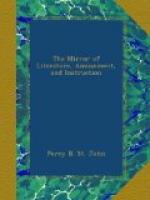At Oakhampton, in Devonshire, there are the remains of a beautiful castle dismantled by Henry VIII. on the attainder of Henry Courtenay, which is situated in a park, concerning which many traditions exist, one of which I will give here as it was told by a native. A great many years ago, there lived a lady at Oakhampton Castle, who was famous for her love of cruelty and for unbounded ostentation. This lady was killed, and her ghost haunted some house in Oakhampton much to the discomfiture of all the inhabitants thereof. A conclave of “most grave and reverend signiors” was convoked, who ordained that the disturbed spirit should every night pluck a blade of grass till all should be gathered. And now, every night at the chilly hour of midnight, the lady in a splendid coach with four skeleton horses, a skeleton coachman, and skeleton footmen, is to be seen in the park obeying the dictum of the Oakhampton worthies. This legend will be found, I am told, in “Fitz, of Fitzford,” by Mrs. Bray. I shall not comment on this, as it evidently appears a wild legend, on which we can found nothing.
There is another tale which I shall recount here, since I can vouch for its authenticity.
During the Irish Rebellion of 1798, a gentleman went to take possession of a house in a lone district of Ireland. The house had been uninhabited for some time, and was out of repair. Between nine and twelve at night, when the gentleman had retired to rest, he was alarmed by hearing a noise; he listened, the noise increased till the house rung with the repeated shocks; he hastily sprung out of bed, and imagining it was the Rebels, he rushed into the room where his servant slept; “Patrick, get up, the Rebels are breaking in,” said he, “Don’t you hear the noise?” “Lord bless yer honor’s worship and glory, it’s only the Daunder.” “Daunder, sir, you rebel, the Daunder, what do you mean?” The servant explained that the knocking was regularly heard every night at the same time, and such was the case. Various parts of the wall were pulled down, and the house almost rebuilt, but to no purpose.
Foley Place. AN ANTIQUARY.
* * * * *
POEMS BY A KING OF PERSIA.
(To the Editor.)
It is rather an unusual thing in the present age to hear of monarchs being authors, and much more so of being poets. It is true, there have been instances of this kind in former times; but perhaps none deserved more notice than Fath Ali Shah, the King of Persia. The author of a collection of elegies and sonnets, Mr. Scott Waring, in his “Tour to Sheeraz,” has exhibited a specimen of the king’s amatory productions. He also states that the government of Kashan, one of the chief cities in Persia, was the reward of the king to the person who excelled in poetical composition.
The four subjoined poems are the production of this celebrated monarch.




